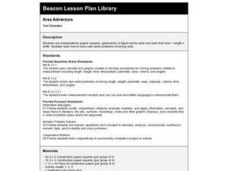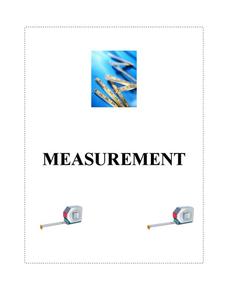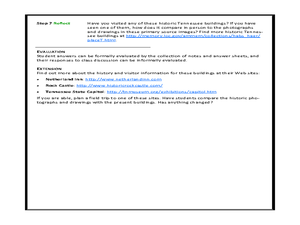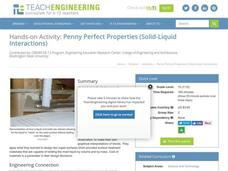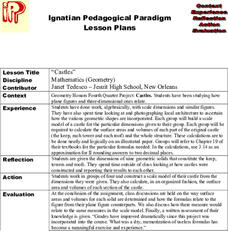Curated OER
Kites
Students build a kite while integrating math and science. In this kite building lesson, students construct a blueprint and apply mathematical formulas while constructing a kite. They use appropriate flight and kite terminology to...
Curated OER
Area Adventure
Students calculate the area of figures using the formula: length x width = area. They solve area problems using paper squares, geoboards, and real-world problems.
Curated OER
Finding Areas of Plane Figures
Pupils compute areas of squares, rectangles, and so on and summarize the formulas for computing areas and explain how the formulas are derived and understand the reasoning behind them.
Curated OER
Measurement
Students identify and categorize different problem situations or contexts using one of four measurements to solve the problem. Through guided and independent practice, they discover ways to determine which measurement to use when...
Curated OER
Finding the Area & Volume of Buildings Using Architectural Drawings
Fifth graders find the area and volume of buildings. For this architecture lesson, 5th graders look at the drawings of three historic Tennessee buildings. They use these to help find the area and volume of the building.
Curated OER
Planetary Surface Evolution and Resurfacing
Students are provided with drawings of planet surfaces in order to investigate different types of planetary terrain. They make observations for each planet and discuss the characteristics observed. The lesson plan includes background...
Curated OER
Searching for Meanings Beneath the Surface of the Poem
Students analyze poetry. In this cultural perspectives lesson, students read the poem "Soccer Until Dusk" by Mark Brazaitis. Students analyze the poem and consider the cultural perspective it reveals.
Teach Engineering
Penny Perfect Properties (Solid-Liquid Interations)
I can get more water to stay on a penny than you can! Collaborative pairs determine the volume of liquids that can be contained on the surface of copper pennies and plastic coins. The pairs analyze their results using graphs and go on to...
Mascil Project
Circular Pave-Stones Backyard
Pack the instructional activity into your plans. Young mathematicians learn about packing and optimization with the context of circular paving stones. They use coins to model the paving stones, and then apply knowledge of circles and...
Willow Tree
Measurement
Build a basic understanding of units of measure and create a great foundation for your learners. The lesson gives a complete overview of everything measurement, from types of measurement to rounding to conversions — it has it all!
Curated OER
Attack of the Raging River
Learners explore mass and volume. For this mass and volume lesson, students pretend to be on a hike and have lost their way. Learners must cross a river get back on track. Students must use mass, volume, surface area, density, property...
Curated OER
Surface Area of Rectagular Prisms
Sixth graders investigate the area of polygons. For this geometry lesson, 6th graders calculate area of prisms using geometric formulas. They work with prisms and other rectangular shapes.
Curated OER
Fencing Your Backyard
Students use geosketch ro create a fence. In this geometry lesson, students identify the amount of material and area needed to create a fence. They calculate the perimeter and surface area of their fence.
Curated OER
Lesson 3 - Water Above the Ground
Students define surface water, drainage basin or watershed. They investigate what affects runoff in a drainage basin. They complete lab sheets and worksheets.
Curated OER
Perimeter and Area
Fifth graders identify the area and perimeter of a rectangle. In this perimeter lesson, 5th graders use geoboards and rubber bands to construct various rectangles. Students use the formula to calculate area and perimeter of the...
Curated OER
Cylinder Volume Lesson Plan
Tenth graders define the formula for cylinders and use it to solve real world problems. In this geometry lesson plan, pupils differentiate between area, perimeters, 2D shapes, 3D shapes, and volume of prisms, cylinders and spheres. They...
Curated OER
TE Activity: The Boxes Go Mobile
Students create a mobile of boxes and cubes that they made in a previous lesson that can be accessed from this page. They design the mobile using method that an engineer would use to balance the items based on surface areas and volumes.
Curated OER
Castles
Young scholars create a scale model to a castle using the dimensions they were given. They calculate the surface areas and volumes of each section of their castle.
National Wildlife Federation
Ghost Town
Around 93 percent of the reefs on Australia's Great Barrier Reef have been bleached, and almost one quarter of them are now dead. Scholars research the sea temperatures, especially around the areas with coral reefs, to make connections...
National Wildlife Federation
Wherefore Art Thou, Albedo?
In the sixth lesson plan in a series of 21, scholars use NASA data to graph and interpret albedo seasonally and over the course of multiple years. This allows learners to compare albedo trends to changes in sea ice with connections to...
Curated OER
Settlement Exploration: Then and Now
NASA has crafted an imaginative and memorable series of lessons, "NASA and Jamestown Education Module." This lesson is one of the five components. In it, middle schoolers connect history and science by comparing the settlement of...
National Wildlife Federation
I’ve Got the POWER! Solar Energy Potential at Your School
Should every school have solar panels? The 19th lesson in a series of 21 has scholars research the feasibility of using solar panels at their school. They begin by gathering data on the solar energy in the area before estimating the...
National Wildlife Federation
Quantifying Land Changes Over Time Using Landsat
"Humans have become a geologic agent comparable to erosion and [volcanic] eruptions ..." Paul J. Crutzen, a Nobel Prize-winning atmospheric chemist. Using Landsat imagery, scholars create a grid showing land use type, such as urban,...
Baylor College
Measuring and Protecting Skin
Several subjects are addressed within the context of a science lesson about the sun's ultraviolet rays. Elementary earth scientists consider protection of the skin with sunscreens (health), estimating and measuring surface area or an...



